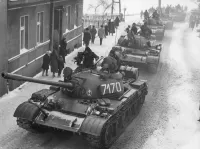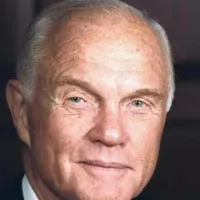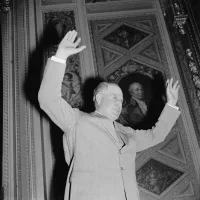Pensacola, Florida is located in the Florida panhandle and serves as the county seat of Escambia County. The city had a population of 54,312 in 2020. Pensacola is the central city of its metropolitan area, which housed 509,905 residents in 2020.
1907: Creeks applied for Eastern Cherokee enrollment
In 1907, 116 Creeks in Pensacola applied for the Eastern Cherokee enrollment, mistakenly believing all Indians were eligible.
1908: Creeks applied for Eastern Cherokee enrollment
In 1908, 116 Creeks in Pensacola applied for the Eastern Cherokee enrollment, mistakenly believing all Indians were eligible.
1908: Citywide streetcar strike
In 1908, a citywide streetcar strike in Pensacola led to the state militia being stationed in the city and martial law being declared.
1914: Naval Air Station Pensacola commissioned
In 1914, Naval Air Station Pensacola (NASP) was the first naval air station commissioned by the U.S. Navy.
1928: Frisco Railroad Access to Pensacola
By 1928, the Frisco Railroad acquired short lines northward from Pensacola to Kimbrough, Alabama, gaining access to the port of Pensacola.
1953: Five Flags Speedway opened
In 1953, the Five Flags Speedway, a half-mile paved racetrack, opened.
1955: End of Frisco Passenger Service
In 1955, Frisco passenger service to Pensacola came to an end.
1958: Pensacola Open inaugural year
In 1958, the city hosted professional golf tournaments such as the Pensacola Open.
1962: John H. Glenn orbited the Earth
In 1962, John H. Glenn, a USMC aviator trained at NASP, became the first American to orbit the Earth.
1965: Pensacola Ladies Invitational inaugural year
In 1965, the city hosted professional golf tournaments such as the Pensacola Ladies Invitational.
1968: Snowball Derby inaugural year
In 1968, Five Flags Speedway started hosting the Snowball Derby stock car race every December.
1968: Pensacola Ladies Invitational last year
In 1968, the city hosted professional golf tournaments such as the Pensacola Ladies Invitational.
1969: Neil Armstrong landed on the Moon
In 1969, Neil Armstrong, a naval aviator trained at NASP, became the first man to set foot on the Moon.
1971: End of L&N Passenger Service
In 1971, L&N passenger service, including the streamlined Gulf Wind, ended with the advent of Amtrak.
1975: Hurricane Eloise landfall
In 1975, Hurricane Eloise made landfall at or near Pensacola.
1979: Hurricane Frederic landfall
In 1979, Hurricane Frederic made landfall at or near Pensacola.
July 14, 1980: Highest temperature ever recorded
On July 14, 1980, Pensacola recorded its highest temperature ever at 106 °F (41 °C).
January 11, 1982: Single-digit temperature
On January 11, 1982, Pensacola recorded a temperature of 8 °F (−13 °C).
January 21, 1985: Record low temperature
On January 21, 1985, Pensacola recorded a temperature of 5 °F (−15 °C).
1985: Hurricane Juan landfall
In 1985, Hurricane Juan made landfall at or near Pensacola.
1986: New city hall opened
In 1986, the current city hall was opened in Pensacola.
1988: Pensacola Open last year
In 1988, the city hosted professional golf tournaments such as the Pensacola Open.
1990: Pensacola Classic inaugural year
In 1990, the city hosted professional golf tournaments such as the Pensacola Classic.
1991: Climate normals
In 1991, climate normals indicate the daily average temperature in January is 53.2 °F (11.8 °C) in Pensacola.
1993: Amtrak Sunset Limited Service to Pensacola
From early 1993, Pensacola was served by the tri-weekly Amtrak Sunset Limited.
1994: Republican Landslide in Florida's 1st Congressional District
In 1994, Republican attorney Joe Scarborough won against Vince Whibbs Jr. for Florida's 1st congressional district. The Republicans swept all of the area's seats in the state legislature, previously held mostly by Democrats.
1995: Hurricane Erin landfall
In 1995, Hurricane Erin made landfall at or near Pensacola.
1995: Pensacola Classic last year
In 1995, the city hosted professional golf tournaments such as the Pensacola Classic.
1998: Hurricane Georges landfall
In 1998, Hurricane Georges made landfall at or near Pensacola.
2000: Census data
As of the 2000 census, there were 56,255 people residing in the city of Pensacola.
2002: Pensacola Pelicans inaugural year
In 2002, the Pensacola Pelicans, an independent league baseball team, started playing at Jim Spooner Field.
September 16, 2004: Hurricane Ivan devastated Pensacola
On September 16, 2004, Pensacola was devastated by Hurricane Ivan, which destroyed a large portion of the I-10 Escambia Bay Bridge and the fishing bridge alongside the Phillip Beale Memorial Bridge.
2004: Hurricane Ivan landfall
In 2004, Hurricane Ivan made landfall at or near Pensacola.
2004: USS Oriskany sunk
In 2004, the USS Oriskany was purposefully sunk to create an artificial reef off the shores of Pensacola.
July 2005: Hurricane Dennis made landfall
In July 2005, Hurricane Dennis made landfall just east of Pensacola, causing moderate damage to downtown with hurricane-force winds.
August 2005: Suspension of Amtrak Service East of New Orleans
In August 2005, Amtrak Sunset Limited service east of New Orleans to Jacksonville and Orlando was suspended due to damage to the rail line of CSX during Hurricane Katrina.
2005: Hurricane Katrina
In 2005, Pensacola received a glancing blow from Hurricane Katrina, resulting in light to moderate damage and a subsequent reduction in tourism from Louisiana, Mississippi, and Alabama.
2008: First Pelican Drop
In 2008, the Pelican Drop New Year's Eve celebration began in downtown Pensacola.
2008: First Pelican Drop New Year's Celebration
The First Pelican Drop New Year's Celebration took place in 2008, organized by the Pensacola Community Redevelopment Agency and broadcast live on WEAR-TV.
2009: New city charter approved
In 2009, citizens voted to approve a new city charter, leading to the adoption of a strong mayor-council form of government in 2011.
2010: Census data
As of the 2010 census, there were 51,923 people residing in the city of Pensacola.
2010: Pensacola Pelicans last year
In 2010, the Pensacola Pelicans, an independent league baseball team, played their last game at Jim Spooner Field.
June 2011: High temperatures recorded
In June 2011, Pensacola experienced temperatures above 100 °F (38 °C), a relatively rare occurrence, with two of the first four days of the month reaching that mark.
2011: Strong mayor-council form of government adopted
In 2011, the city of Pensacola adopted a strong mayor-council form of government.
June 2012: Flooding
In June 2012, over one foot (300 mm) of rain fell on Pensacola and adjacent areas, leading to widespread flooding.
June 11, 2013: Charter amendment approved
On June 11, 2013, Pensacola voters approved a charter amendment that eliminated the two at-large seats on the city council.
April 29, 2014: Flooding
On April 29, 2014, Pensacola was drenched by at least 20 inches of rain within a 24-hour period, causing the worst flooding in 30 years.
November 4, 2014: Charter amendments approved
On November 4, 2014, two additional charter amendments were approved, making the position of mayor subject to recall and providing the city council with the authority to hire staff.
November 2014: At-large seat phased out
In November 2014, one of the two at-large seats on the city council was phased out.
2014: Top-20 events in the Southeast
In 2014, the Pelican Drop event was named as one of the top-20 events in the Southeast by the Southeast Tourism Society.
January 8, 2015: Low temperature
On January 8, 2015, Pensacola recorded a low temperature of 19 °F (−7.2 °C).
February 23, 2016: EF3 wedge tornado
On February 23, 2016, a large EF3 wedge tornado hit the northwest part of Pensacola, causing major damage and several injuries.
November 2016: At-large seat expired
In November 2016, the second at-large seat on the city council expired.
December 9, 2017: Snowfall event
On December 9, 2017, Pensacola experienced a snowfall event.
2017: Pelican drop simulcast
Beginning with the 2017 celebration, Pelican Drop events were carried in simulcast on WEAR's website.
2018: Winter season
During the winter season of 2018, Pensacola did not record a freeze.
2018: The Pelican Drop
In 2018, The Pelican Drop was a significant attraction in the area, drawing in crowds of up to 50,000 local residents and visitors.
June 1, 2019: Florida Gulf & Atlantic Railroad Acquisition
On June 1, 2019, the Florida Gulf & Atlantic Railroad acquired the CSX main line from Pensacola to Baldwin, Florida.
December 2019: Pelican Drop canceled
In December 2019, organizers announced that the Pelican Drop had been canceled due to financial issues and the burden the event had caused on local police and public services. A smaller fireworks display, which does not require the same amount of traffic disruption, would be held instead.
September 2020: Hurricane Sally caused heavy damage
In September 2020, Pensacola suffered heavy damage from Hurricane Sally, with damages in Escambia County estimated at $29 million, and downtown Pensacola experienced flooding.
2020: Census data
According to the 2020 census, Pensacola had a population of 54,312 people residing in 24,748 households, with a population density of 2,395.7 inhabitants per square mile.
2020: Population at the 2020 census
In 2020, the city of Pensacola had a population of 54,312 according to the census.
August 2023: Airlines Serving Pensacola International Airport
As of August 2023, airlines serving Pensacola International Airport include American Airlines, Delta Air Lines, Frontier Airlines, Silver Airways, Southwest Airlines, Spirit Airlines, and United Airlines.
2023: American Community Survey
As of the 2023 American Community Survey, Pensacola has 24,979 estimated households with an average of 2.14 persons per household and a median household income of $72,699.
September 7, 2024: Commissioning ceremony of the USS Richard M. McCool Jr.
On September 7, 2024, NASP hosted the commissioning ceremony of the United States Navy's newest amphibious transport dock, the USS Richard M. McCool Jr. (LPD 29).
2024: American Magic home port
In 2024, America's Cup team American Magic called Pensacola their home port until the America's Cup commenced.
2024: Jimmy Patronis Wins Special Election
In November 2024, Jimmy Patronis (R) won a special election to represent Pensacola in the United States House of Representatives following Matt Gaetz's resignation.
January 21, 2025: Snowfall event
On January 21, 2025, Pensacola experienced a snowfall event with record-breaking accumulations of up to 9.4 inches (24 cm) and near-blizzard conditions.
Mentioned in this timeline

Matt Gaetz is an American politician and lawyer As a...

Martial law is the imposition of military rule in place...

Charles Joseph Scarborough is an American television host attorney political...

John Herschel Glenn Jr was a multifaceted American figure who...
Florida a state in the Southeastern United States is largely...

A tornado is a rotating column of air connecting the...
Trending

26 minutes ago Victoria Mboko surges into WTA 1000 final after defeating Ostapenko in Doha.

27 minutes ago House Passes SAVE America Act: Senate Battle Looms Over Voting Rights

1 hour ago De Minaur Advances in Rotterdam; ABN AMRO Tournament Prediction; News Announcement Disappoints Fans

1 hour ago Julia Simon wins Gold; German Biathletes Preuss & Voigt Miss Podium at Olympia.
1 hour ago Son's American Idol Audition Makes Country Star Cry; Franklin Resident Joins

2 hours ago Navalny Killed by Russia Using Dart Frog Toxin, UK and Europe Claim.
Popular

Kid Rock born Robert James Ritchie is an American musician...
The Winter Olympic Games a major international multi-sport event held...

Pam Bondi is an American attorney lobbyist and politician currently...

Barack Obama the th U S President - was the...

XXXTentacion born Jahseh Dwayne Ricardo Onfroy was a controversial yet...
Randall Adam Fine is an American politician a Republican who...